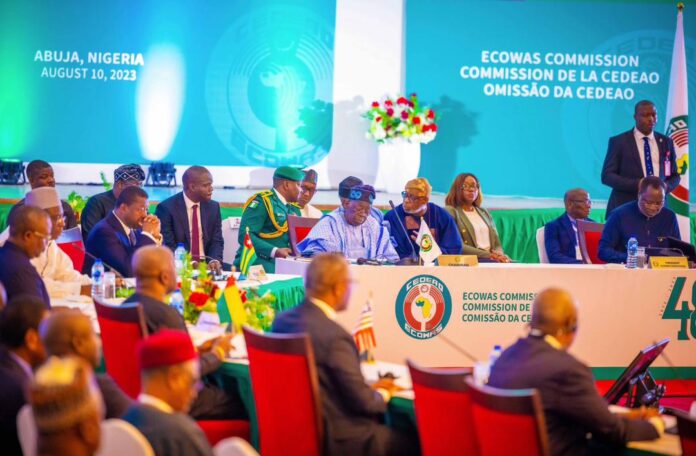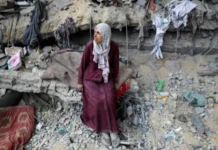ECOWAS calls emergency meeting with Niger, Mali, Burkina Faso
The Economic Community of West African States (ECOWAS) is making a final effort to engage with Niger, Mali, and Burkina Faso as the three countries prepare to formally withdraw from the regional bloc on January 29, 2025.
Joel Ahofodji, the Head of Communication at the ECOWAS Commission, confirmed to newsmen on Monday that letters requesting meetings with the military-led governments of these nations have been sent.
“ECOWAS has dispatched letters requesting meetings, and we are awaiting official responses,” Ahofodji said.
When asked whether the countries had reached out to ECOWAS to reconsider their decisions, Ahofodji replied, “No.”
This engagement comes as ECOWAS moves to approve the withdrawal of Niger, Mali, and Burkina Faso, after the expiration of a one-year notice period under Article 91 of the Revised ECOWAS Treaty. The bloc had given the countries a six-month transitional period, ending July 29, 2025, to finalize withdrawal procedures and explore possible reconciliation.
READ ALSO: ECOWAS gives Niger, Mali, Burkina Faso 6-month ultimatum
During the 66th Ordinary Session of ECOWAS in December 2024, President of the ECOWAS Commission Dr. Omar Touray emphasized the bloc’s openness to continued dialogue with the three countries during this transitional phase. Additionally, he announced the extension of the mediation efforts by Senegalese President Bassirou Faye and Togolese President Faure Gnassingbé to continue engaging with the withdrawing nations.
The three countries—Niger, Mali, and Burkina Faso—have accused ECOWAS of abandoning its founding principles and bowing to external pressures, particularly in enforcing sanctions following military coups in these nations. In response, the countries formed the Alliance of Sahel States, focusing on mutual defense and distancing themselves from Western allies like France, while seeking stronger ties with Russia.
As the deadline for withdrawal approaches, ECOWAS faces the complex challenge of managing the consequences of this unprecedented exit and preserving regional stability.
President Bola Tinubu, who chairs the ECOWAS Authority, has reiterated the bloc’s commitment to diplomatic solutions while safeguarding the welfare of citizens.
Meanwhile, the Head of the European Union Delegation to Nigeria and ECOWAS, Ambassador Gautier Mignot, called on ECOWAS to adopt a new approach in dealing with Burkina Faso, Mali, and Niger, now collectively known as the Alliance of Sahel States.
Speaking in Abuja on Monday, Mignot expressed the EU’s regret over the withdrawal, emphasizing the importance of regional integration for prosperity and stability.
“It’s a decision we regret because we strongly support West African integration. Splitting doesn’t seem like a good idea,” he said. Drawing a comparison to the EU’s own experience with Brexit, Mignot stressed the need for dialogue and negotiation when managing such exits.
“Even if you leave a regional integration arrangement, geographically you remain neighbors. You have to find new ways of coexisting and cooperating,” Mignot added, offering the EU’s expertise to assist ECOWAS in managing the transition.
The EU has continued its humanitarian support in these countries and adapted its development aid to address the growing security and humanitarian crisis in the Sahel. Mignot underscored the EU’s concern about the rising number of displaced persons, refugees, and people in need, which has reached unprecedented levels.
“The EU remains committed to supporting the people in the Sahel,” he said, while also highlighting ongoing work in Brussels for a renewed approach to the region, based on dialogue and cooperation with regional partners.
On the broader relationship between the EU and Nigeria, Mignot reaffirmed the EU’s commitment to being a reliable partner, emphasizing Nigeria’s importance as a key player in Africa and globally.
ECOWAS, formed in 1975 to promote economic integration across West Africa, has faced challenges in recent years due to a wave of military coups, including in Mali (2020, 2021), Burkina Faso (2022), and Niger (2023). These coups have raised concerns about the region’s stability and have strained relations within the bloc.
In July 2023, a coup in Niger saw President Mohamed Bazoum detained by his presidential guard, with General Abdourahamane Tchiani, the head of the guard, declaring himself leader of the new military junta.
Similarly, in Burkina Faso, a coup in September 2022 ousted Interim President Paul-Henri Sandaogo Damiba after he was accused of failing to tackle the growing Islamist insurgency. Captain Ibrahim Traoré took over leadership as interim head of state.
In Mali, a military mutiny in August 2020 escalated into a coup, resulting in the removal of President Ibrahim Boubacar Keita. The instability in these countries has contributed to the region’s growing security concerns.
Follow the Neptune Prime channel on WhatsApp:
Do you have breaking news, interview request, opinion, suggestion, or want your event covered? Email us at neptuneprime2233@gmail.com





